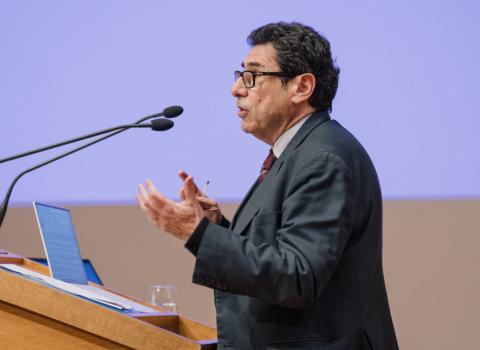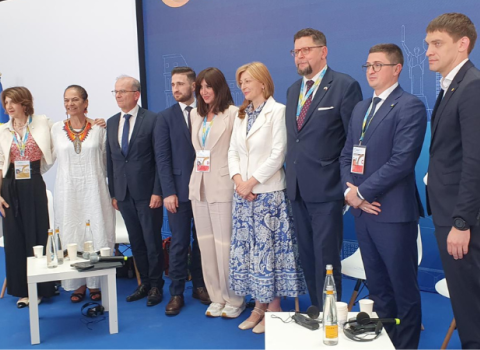Society at large needs to be engaged in science, but the level of involvement - of necessity - varies between fields, Brussels conference hears

Photo: Lysiane Pons
There is very little that an ordinary citizen can do to help discover a black hole or solve a difficult mathematics problem, but – wherever possible – society at large can and should contribute to science, said delegates at a conference organised by the Berlin University Alliance (BUA) in Brussels last week.
The European Commission has been trying to boost public engagement in its flagship research and innovation programme, Horizon Europe. About 25% of the topics in the Horizon calls for 2021 and 2022 require some form of involvement, while research missions – through which the EU hopes to fix five of society’s greatest challenges – explicitly call for broad citizen engagement.
However, it is still unclear in what capacity citizens should be involved in European science and how they can contribute to scientific breakthroughs in EU-funded programmes.
For Maria Leptin, the president of the European Research Council (ERC), as taxpayers, citizens should be enabled to understand the value of science, “if we want them to continue to pay big bucks” for research that both satisfies basic human curiosity and enables societies to deal with crises. However, “not all citizens understand the scientific method and that makes difficult any attempt to engage with society,” Leptin told delegates.
Given this, there is a need for research institutions to distinguish at what levels citizens can be involved.
The first task is to help increase understanding among non-scientists of uncertainty and that scientific findings – although often presented as facts – are based on probabilities, and can change depending on the evidence available and as new data are accumulated.
Research institutions and scientists should then devise ways to encourage citizens to participate in science projects, for example by involving them in the field work of collecting data. “I've seen some very nice applications at the ERC for worldwide projects collecting inspect species or observing birds,” said Leptin. “There's many levels at which participation is possible and desirable, but that obviously varies between fields.”
Things get more complicated when it comes to making decisions about what topics should be included in research funding programmes. Here, Leptin argued the power to decide should be delegated to experts. “You don’t get somebody to go to a three-star Michelin [restaurant] saying, ‘I’ll help you cook tonight’,” she said.
“We live, most of us, in representative democracies where we delegate the power to decide, and citizens have delegated the power to decide on research programmes, to our governments and the ministries and the EU, and I think that is largely correct,” said Leptin.
Guenther Ziegler, the president of the Freie Universität Berlin, said that engaging society in early-stage research is more difficult. “I'm a mathematician and I don't believe that fundamental mathematics should be done in transdisciplinary research jointly with society,” he said.
Christian Ehler MEP, the European Parliament’s co-rapporteur on Horizon Europe, noted countries have different ways of developing their scientific agendas and not all approaches include citizens in the mix. While some governments organise some forms of citizen engagement, others prefer taking top-down decisions about their research agenda.
Mariya Gabriel, EU commissioner for research and innovation, said society at large could be involved in both basic and applied research. “The level of sophistication and modalities of such involvement should be calibrated to fit the purpose,” she said.
According to Christopher Baum, chief translational research Officer at Charité university hospital in Berlin, science has tremendous impact in society and culture and the EU should showcase practical examples of the benefits of including citizens in research.
Not long after the National Institutes of Health (NIH) in the US started looking into patient reported outcomes, it partnered with other institutions to develop objective measures of these outcomes, which are now a mandatory component of clinical trials. “That is the clear success of patient and stakeholder involvement in research,” said Baum. “Without objective patient reported outcome measurement, you can't licence a drug.”
Sophia Becker, vice president of TU Berlin, said her university has just launched a science and society office to improve and better organise societal engagement in research. “Maybe these changes appear slow from the outside. However, they are happening and we try to accelerate,” she said.
Research assessment reform
Anna Panagopoulou, director of European Research Area & innovation at the Commission’s DG RTD, said that reforming research assessment could help promote meaningful engagement of the general public in research.
Member states have recently agreed that an updated and more relevant system for assessing the value of scientific research should recognise aspects including open collaboration, knowledge sharing and public engagement. The 27 ministers acknowledged it is time for the EU to revamp how it evaluates research, putting more weight into the quality of research outcomes rather than quantitative indicators such as journal impact factors and number of citations.
At the same time, research organisations and the Commission are continuing to draft an agreement on principles that should underpin upcoming research assessment reforms.
“I believe the research assessment [reform] is a way to address many of the issues that we're discussing today and to promote sustainable engagement,” said Panagopoulou. “But I do think that's extremely challenging, we have to respect the autonomy of institutions that are around the table.”
Baum noted that further discussions are needed before deciding how to involve society in research assessment. “I think we should dig deeper with respect to the question of how we can involve society in research assessment,” he said.
Ziegler said he is “rather sceptical” about the research assessment reform. “In the end, the question of how we assess research and how researchers are assessed is very difficult and that needs a rather broad and deep understanding,” said Ziegler.





 A unique international forum for public research organisations and companies to connect their external engagement with strategic interests around their R&D system.
A unique international forum for public research organisations and companies to connect their external engagement with strategic interests around their R&D system.